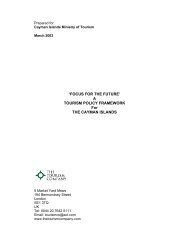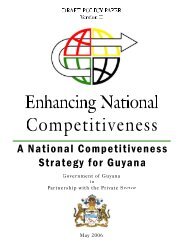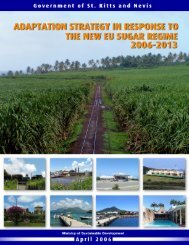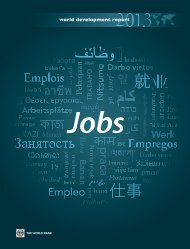Business Removing
Doing Business in 2005 -- Removing Obstacles to Growth
Doing Business in 2005 -- Removing Obstacles to Growth
- No tags were found...
Create successful ePaper yourself
Turn your PDF publications into a flip-book with our unique Google optimized e-Paper software.
PROTECTING INVESTORS 51<br />
FIGURE 7.1<br />
Few initial public offerings outside OECD and East Asia<br />
Number of initial public offerings, 2003<br />
Top 5<br />
144 United States<br />
125 Japan<br />
105 Canada<br />
97 China<br />
88 Australia<br />
81 Korea<br />
56 Malaysia<br />
Source: Bloomberg and National Stock Exchange websites.<br />
Indonesia 6<br />
India 6<br />
Philippines 4<br />
South Africa 3<br />
Poland 2<br />
Mexico 1<br />
Turkey 1<br />
FIGURE 7.2<br />
Ownership is concentrated in developing countries<br />
Percentage ownership of the 3 largest investors<br />
in the 10 largest publicly listed companies<br />
68<br />
Russia<br />
64<br />
Mexico<br />
Source: World Bank (2004d).<br />
62<br />
Egypt<br />
Arab Rep.<br />
58<br />
57<br />
Indonesia Brazil United<br />
States<br />
19 18<br />
Japan<br />
thing in the Philippines from electricity, telecommunications,<br />
banking, beer and tobacco, newspaper publishing,<br />
television stations, shipping, oil and mining, hotels and<br />
beach resorts, down to coconut milling, small farms, real<br />
estate and insurance.” 7 With such powerful controlling<br />
shareholders and few protections, small investors do not<br />
risk their money buying public equity.<br />
Firms in poor countries need private equity finance,<br />
as seen in Kwadwo’s search for partners. But investors are<br />
scarce. In Indonesia, for example, equity accounts for<br />
only 2% of financing in small businesses. In Romania,<br />
5%. In Venezuela, 7%. In contrast, it is nearly a quarter<br />
of financing in Malaysia. 8 This is not because equity is<br />
unnecessary. Firms in poor countries are twice as likely<br />
to report that a lack of equity finance is an obstacle to<br />
growth—42%, compared with 20% in rich countries. 9<br />
But no investor will put money where it is not safe.<br />
What encourages equity investment?<br />
What investors fear the most is having their money expropriated.<br />
Whether the company is private or public,<br />
expropriation of minority shareholders may be achieved<br />
by selling products or assets at below-market prices,<br />
buying products or assets at above-market prices, taking<br />
business opportunities away from the company and issuing<br />
loans at preferential rates. In many countries with<br />
poor legal protections, clever entrepreneurs can devise<br />
ways to deny fair returns to investors while remaining<br />
within the law. 10<br />
Doing <strong>Business</strong> distinguishes 3 dimensions of investor<br />
protection: disclosure of ownership and financial<br />
information; legal protections of small investors; and enforcement<br />
capabilities in the courts or securities regulator.<br />
This year the focus is primarily on disclosure of<br />
ownership and financial information and on shareholder<br />
protections, with some discussion on enforcement.<br />
Analysis of enforcement will be developed further in next<br />
year’s report.<br />
Disclosure<br />
Consider 5 examples of popular expropriation methods:<br />
• In 1996 controlling shareholders of Aeroflot, Russia’s<br />
largest airline, set up a company to handle Aeroflot’s<br />
overseas revenues—but with a 6-month payment delay.<br />
Aeroflot covered the gap by borrowing from another<br />
company—owned by the same controlling shareholders—at<br />
above-market interest rates. More than $600<br />
million was siphoned. 11<br />
• In 1998 Peronnet, a French company, rented a warehouse<br />
from SCI at above-market rates. Unbeknownst to<br />
small investors, Peronnet’s controlling shareholder had<br />
established SCI, which bought land and built the warehouse<br />
to lease back to Peronnet. 12<br />
• In 2001 LeisureNet, a fitness company in South<br />
Africa, collapsed. The failure was triggered by a $7 million<br />
investment in a chain of gyms in Germany. Subsequent<br />
investigation revealed that the intermediary company,<br />
Dalmore, was jointly owned by the managers of<br />
LeisureNet. Each pocketed over $1 million. 13

















